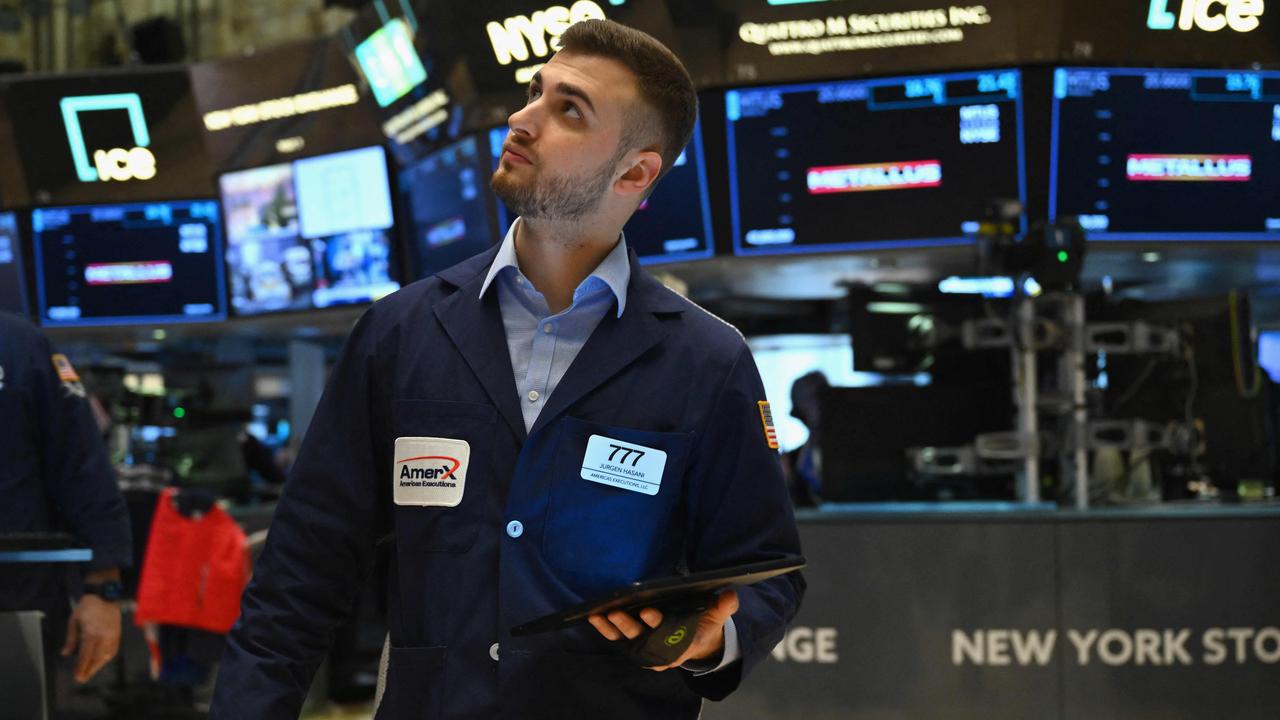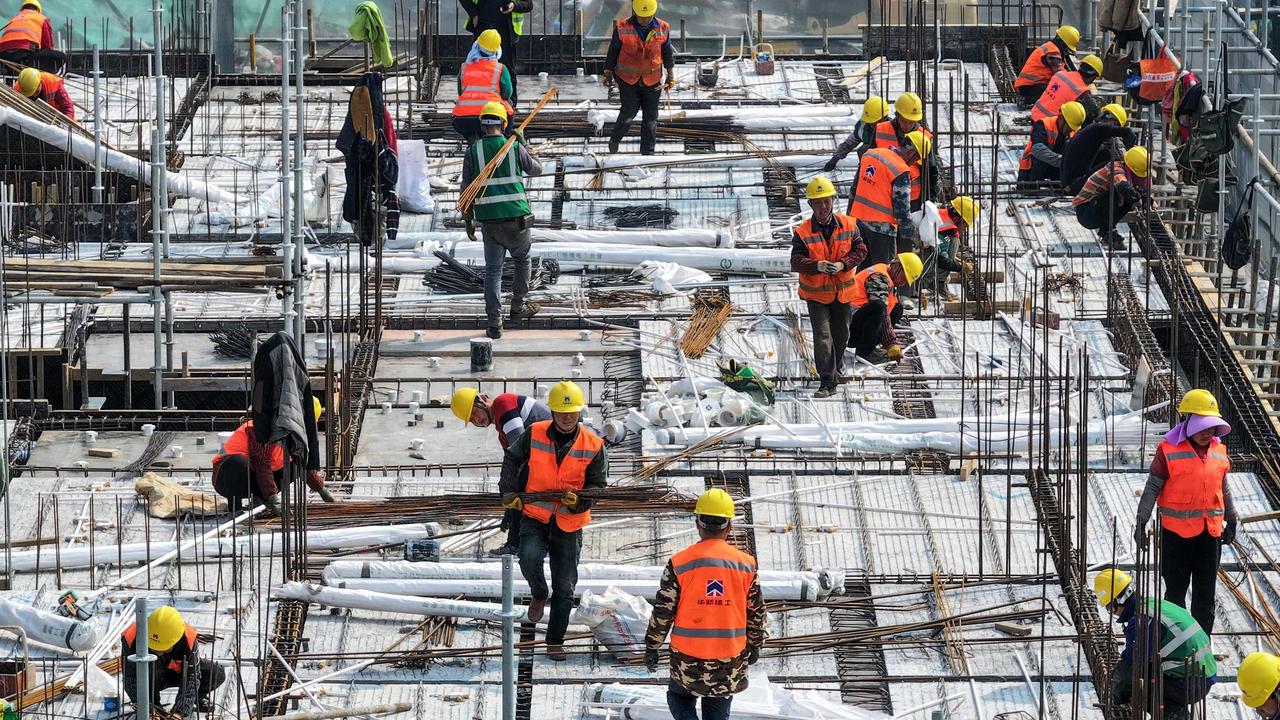The five black swans threatening the stock market boom
History shows there’s been plenty of booms before a mighty fall. These are the top risks lurking in the shadows that could derail the recovery.

Business
Don't miss out on the headlines from Business. Followed categories will be added to My News.
The world’s hottest artificial intelligence stock, Nvidia, just got even hotter. This week it piled on more than $US100bn in a single session, as all the momentum behind it barrelled over any lingering fears of inflation.
The warm glow from AI is spilling into markets more broadly, with Wall Street’s benchmark S&P 500, the tech-backed Nasdaq and markets from Japan and across Europe hitting record highs in recent weeks.
Australia’s benchmark ASX 200 touched a record high last week, although it pulled back on Monday around jitters over iron ore. That was a temporary blip and it is now gaining ground again.

History shows there’s been plenty of market booms before a mighty fall. There was the dot.com boom in 2000, the financial trash rally leading into the GFC; the duration bubble of last decade and the high-octane liquidity bubble exploding out of Covid (2020-21).
Is this time any different?
Well-regarded MST Marquee strategist Hasan Tevfik has been speaking with clients in recent weeks about the risks behind the markets. He is not a market bear by any measure, expecting the eventual lower cash rates (liquidity) to support corporate earnings (growth).
“That’s two of the three most important ingredients for markets doing pretty well,” he says.
The third ingredient is strong fundamentals like the transformative nature of AI.
But what of the risks? These are five negative shocks or “black swans” big investors are thinking about that each have the potential to derail global markets.
AI bubble pops
The tech boom; the expected EV boom pushing up lithium; the energy super-cycle; buy now, pay later – you name it: everything touted to last forever eventually finds gravity.
What if the fundamental assumptions we have today around the massive demand for AI fail to materialise? The frenzy has been driving the key generative AI stocks Microsoft, Alphabet, Amazon and Facebook owner Meta Platforms like nothing else. The leader of the pack is chip-maker Nvidia, which is expected to be the big beneficiary of the tens of billions in R&D being thrown at the AI race. Nvidia shares alone are up 300 per cent in one year giving it a valuation of $US2.3 trillion.

All these tech stocks form the rump of the Magnificent Seven which is collectively up nearly 70 per cent over the year to deliver the bulk of the gains of Wall Street’s S&P 500. Demand for everything AI is real, with businesses looking at ways it can improve processes. But any suggestion of overcapacity would have an enormous impact. JP Morgan’s equity strategy team led by Dubravko Lakos-Bujas this week sounded a warning about extreme crowding of investors in the Magnificent Seven stocks. “While the bull beta of the market to Nvidia is significant – as well as for Meta and Amazon – the bear beta of the market to these stocks is even stronger. In other words, a sharp fall will be much more severe for the broader market than the upside from an ongoing rally.
Geopolitics
From the Middle East to Europe, take your pick of hot spots. The Middle East tensions have so far been relatively contained to Israel, although some skirmishes near the trade route of the Red Sea pushing up shipping costs. A regional breakout has the potential for contagion into Iran or even Saudi Arabia that will have a big impact on oil and energy markets.
In Europe, the Ukraine-Russian war is grinding into its third year. While global supply chains and energy markets have recovered from the initial shock, any escalation or the drawing in of NATO partners into the conflict will have a profound impact on inflation and markets. The resumption of a US-China trade war remains a strong possibility if Donald Trump is re-elected as president this coming November. And lurking in the corners is an even bigger shock for global markets. That’s the possibility of China deciding to invade Taiwan, particularly if it sees an opening if Trump takes power again. That represents the biggest Black Swan and, it would take China, the second-biggest economy, out of global trade. The implications for Australia in any regional conflict are significant.
Job market cracks
MST Marquee’s Tevfik points out while interest rates have been rising, the economy here and in the US have been held up by the very resilient labour market. Many large companies have been foregoing profit growth or using prices to protect margins while holding back on deep job cut programs.

“There’s clear signs of labour hoarding going on. Companies, at least for now, are prioritising consistency of workforce over near term profits,” Tevfik says. This has kept job markets tight, even with an economic slowdown now underway. Bosses overwhelmingly expect the economy to pick up with rate cuts just around the corner, and they will already have the labour in place to meet the expected growth. If the soft landing morphs into a hard landing, “companies will just give way” on hoarding jobs, Tevfik says. While people have jobs they keep spending even as interest rates are holding higher. Banks also monitor unemployment as that, is the single biggest barometer of future lending losses. If the jobs market cracks, that feeds into consumption, this is likely to have an outsized impact on the economy. Tevfik says one number to watch, is the gauge of hours worked. There are already signs this figure has stalled both here and the US as bosses cut back hours to save on costs. More falls here will quickly impact consumer spending.
Inflation
Former Reserve Bank boss Philip Lowe said it was right for the central bank to recently warn about the “two-way risks” of inflation. Already, expectations of early interest rate cuts in the US are being pushed back. Also weighing in, JPMorgan Chase boss Jamie Dimon this week said US interest rates were likely to stay on hold until at least June. This means the talk of as much as six interest rate cuts there this year was way too bullish. A reversal of the interest rate cut story would quickly deflate shares, particularly as money again rushes into the bond market.

Indeed, the higher-for-longer interest rate story might be a load too much for companies to carry and start hurting earnings. Tevfik says there are real risks of “waves of inflation”. Already this week, US inflation numbers came in slightly higher than expected. Demand continues in the US economy with massive fiscal spending programs in place. Globally the OPEC cartel is managing to keep oil prices high, while services inflation remains sticky and rent and insurance costs remain pressured on the supply side. As everyone prepares for rates to go down, the risks are there they will go up. Lowe issued a timely economic reminder this week: “Things can often turn out different to what you expect”.
China property
A sharper downturn in China growth will have an outsized impact on Australia, particularly mining earnings with commodities like iron ore, copper and coal to really hurt. So far, prices have held up even in the face of a deeply troubled housing market there. An overbuild has left China with more than two years supply of housing stock and this is undermining prices and confidence with many households having their wealth tied up in property.

This month, China’s National People’s Congress set a growth target of “about 5 per cent”. Economists have already raised doubts about the target being met, given the weakness in the consumer sector and reluctance from Beijing to issue a “big hit” stimulus to kickstart confidence. Authorities have however announced a number of modest measures to spur on sales of property, consumer electronics and new cars. There are some bright spots, household savings rates remain high – equating to more than 17 per cent of GDP, but discretionary spending is muted. The other strength is infrastructure where fixed investment is running at high single digit per cent change and this has been holding up commodity prices. If the global economy grows, China’s slowdown should be cushioned by its massive export engine. Any sudden changes to China’s current path or a deeper property crash will be felt around the world.
johnstone@theaustralian.com.au
Originally published as The five black swans threatening the stock market boom







